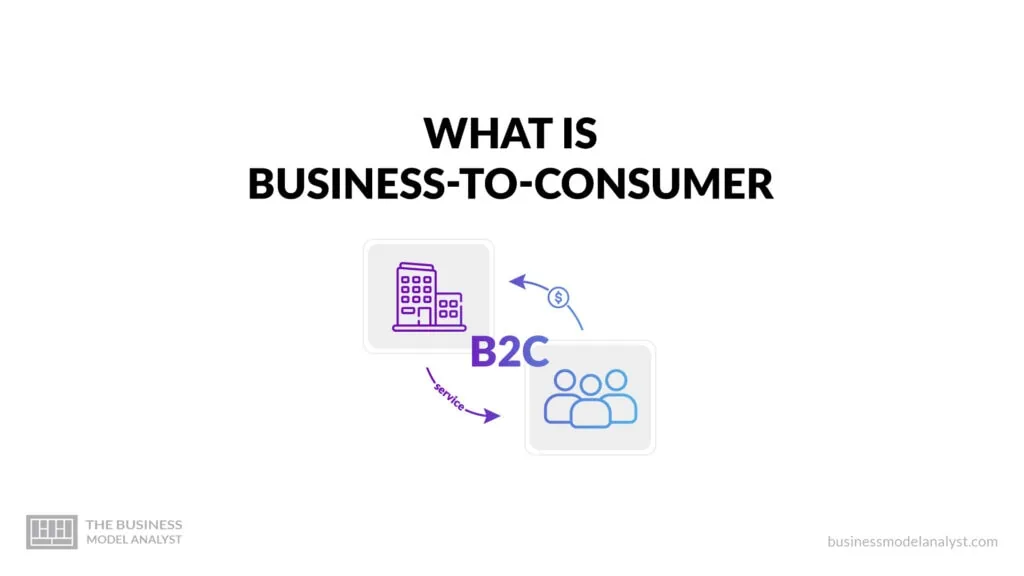

Business-to-Consumer (B2C) refers to the transactions between a business and individual consumers. In other words, it is the process of selling products or services directly to the end users. B2C is a popular business model that has gained traction in recent years due to the rise of e-commerce and the increasing number of consumers who prefer to shop online.
B2C businesses typically focus on marketing their products or services to a specific target audience, which helps them to build brand loyalty and increase sales. These businesses also tend to offer a wide range of products or services to cater to the diverse needs of their customers. The success of a B2C business depends on its ability to understand the needs and preferences of its target audience and provide them with high-quality products or services that meet their expectations.
Business-to-Consumer (B2C) is a type of commerce transaction that involves the exchange of goods or services between a business and a consumer. In this model, businesses sell their products or services directly to individual customers who use them for personal consumption or use.
B2C transactions occur in various forms, including online shopping, retail stores, and direct mail marketing. The rise of e-commerce platforms has made it easier for businesses to sell their products directly to consumers, allowing for a more personalized and efficient shopping experience.
Businesses that engage in B2C transactions typically focus on building strong relationships with their customers. They do this by offering high-quality products, exceptional customer service, and personalized marketing campaigns that cater to the unique needs and preferences of individual consumers.
Some of the critical characteristics of B2C transactions include shorter sales cycles, lower transaction volumes, and a focus on building brand loyalty. Businesses that operate in the B2C space must be able to adapt quickly to changing consumer preferences and market trends to remain competitive in the industry.
Business-to-Consumer (B2C) and Business-to-Business (B2B) are two different types of e-commerce models. B2C refers to transactions between businesses and individual consumers, while B2B refers to transactions between businesses. Understanding the differences between these two models is essential for businesses that want to succeed in the online marketplace.
One of the most significant differences between B2C and B2B is the target audience. B2C companies focus on individuals, often selling products or services that are designed for personal use. B2B companies, on the other hand, sell products or services to other businesses. This means that B2B companies need to focus on building relationships with other businesses, while B2C companies need to focus on building relationships with individual consumers.
Another important difference between B2C and B2B is the sales process. B2C transactions are typically straightforward and don’t involve a lot of negotiation or customization. B2B transactions, on the other hand, are often more complex and involve a lot of negotiation and customization. This is because businesses often have specific needs and requirements that need to be addressed.
Finally, the marketing strategies used in B2C and B2B are also different. B2C companies often focus on creating emotional connections with their customers, using advertising and other marketing tactics to appeal to their emotions. B2B companies, on the other hand, focus on building trust and credibility with other businesses. This often involves creating content that demonstrates their expertise and knowledge in a particular industry.
| B2C | B2B |
| Target audience: individual consumers | Target audience: other businesses |
| Sales process: straightforward | Sales process: complex |
| Marketing strategy: emotional appeal | Marketing strategy: trust and credibility |
Overall, B2C and B2B are two distinct e-commerce models that require different approaches to succeed. Businesses that want to succeed in the online marketplace need to understand the differences between these two models and tailor their strategies accordingly.
Direct sellers are companies that sell directly to the end consumer without any intermediaries. These companies often have a sales force that works on commission and sells products door-to-door or through home parties. Examples of direct sellers include Avon, Mary Kay, and Tupperware.
Online intermediaries are companies that facilitate transactions between buyers and sellers on their platform. These companies make money by charging a commission or a transaction fee. Examples of online intermediaries include Amazon, eBay, and Airbnb.
Advertising-based companies generate revenue by selling advertising space on their platform. These companies often offer their services for free to consumers and make money by displaying ads. Examples of advertising-based companies include Facebook, Google, and Instagram.
Community-based companies create a platform where consumers can connect with each other and share information. These companies often make money by charging a membership fee or offering premium services. Examples of community-based companies include LinkedIn, Yelp, and Reddit.
Fee-based companies charge consumers a fee for their services. These companies often offer a specialized service or product that consumers are willing to pay for. Examples of fee-based companies include Netflix, Spotify, and Dropbox.
In conclusion, there are several model types of B2C companies, each with its own unique way of generating revenue. Direct sellers sell directly to consumers, online intermediaries facilitate transactions, advertising-based companies sell advertising space, community-based companies create a platform for consumers to connect, and fee-based companies charge consumers a fee for their services.
Business-to-Consumer (B2C) companies are those that sell products or services directly to individual consumers. These companies operate in a wide range of industries, from retail to healthcare to entertainment. Here are some examples of successful B2C companies:
| Company | Industry | Product/Service |
| Amazon | Retail | Online marketplace for products and services |
| Netflix | Entertainment | Streaming service for TV shows and movies |
| Uber | Transportation | Ride-sharing platform |
| Zocdoc | Healthcare | Online platform for booking doctor appointments |
Amazon is one of the largest B2C companies in the world, offering a wide range of products and services through its online marketplace. Netflix has revolutionized the entertainment industry by providing a convenient and affordable way for consumers to access TV shows and movies. Uber has disrupted the transportation industry by offering an alternative to traditional taxi services. Zocdoc has made it easier for consumers to book doctor appointments, saving time and reducing frustration.
Other successful B2C companies include Apple, Nike, Coca-Cola, and Procter & Gamble (P&G). These companies have built strong brands and loyal customer bases by providing high-quality products and services that meet the needs and desires of consumers.
One of the biggest benefits of B2C is the potential for increased sales. By selling directly to consumers, businesses can tap into a large and diverse market. This can lead to higher sales volumes and increased revenue. Additionally, B2C businesses can use targeted marketing strategies to reach specific customer segments, which can further boost sales.
Another advantage of B2C is the opportunity for direct customer interaction. By selling directly to consumers, businesses can build relationships with their customers and gain valuable feedback. This can help businesses improve their products and services and better meet customer needs. Direct customer interaction can also lead to increased brand loyalty, as customers feel a stronger connection to businesses that take the time to engage with them.
Brand loyalty is a key benefit of B2C. By selling directly to consumers, businesses can build strong brand identities and cultivate loyal customer bases. This can lead to repeat business and positive word-of-mouth marketing. Additionally, B2C businesses can use social media and other digital marketing channels to engage with customers and build brand awareness.
Overall, B2C offers many benefits for businesses looking to reach and engage with consumers. By tapping into a large and diverse market, building strong customer relationships, and cultivating brand loyalty, B2C businesses can achieve long-term success and growth.
One of the biggest challenges in B2C marketing is intense competition. With so many companies vying for the attention of consumers, it can be difficult to stand out from the crowd. This is especially true in industries that are already saturated with competitors. Companies must work hard to differentiate themselves from their competitors and provide a unique value proposition to their customers.
B2C marketing can be expensive, especially when it comes to advertising and promotion. Companies must invest significant resources into creating and distributing marketing materials, such as television and radio ads, billboards, and print advertisements. In addition, digital marketing channels such as social media and search engine advertising can also be costly. As a result, companies must carefully manage their marketing budgets to ensure that they are getting the best return on investment.
Acquiring and retaining customers is another major challenge in B2C marketing. Consumers have many options when it comes to purchasing products and services, and companies must work hard to attract and retain their business. This involves creating compelling marketing messages that resonate with consumers, as well as providing excellent customer service and support. Companies must also work to build brand loyalty among their customers, which can help to ensure long-term success.
In conclusion, B2C marketing presents a number of challenges for companies. These include intense competition, high marketing costs, and the need to acquire and retain customers. However, with careful planning and execution, companies can overcome these challenges and succeed in the B2C marketplace.
Business-to-Consumer (B2C) marketing is all about selling products and services directly to individual consumers. Here are some effective B2C strategies:
Personalization is the process of tailoring marketing messages and experiences to individual consumers based on their preferences, behaviors, and purchase history. By personalizing your marketing efforts, you can increase customer engagement, loyalty, and sales. Some ways to personalize your B2C marketing include:
Multichannel marketing is the practice of reaching consumers through multiple channels, such as email, social media, mobile apps, and in-store experiences. By using a variety of channels, you can increase brand awareness, customer engagement, and sales. Some tips for effective multichannel marketing include:
Social media marketing is a powerful tool for B2C companies to connect with consumers, build brand awareness, and drive sales. Some best practices for social media marketing include:
By implementing these effective B2C strategies, you can drive customer engagement, loyalty, and sales for your business.
In conclusion, Business-to-Consumer (B2C) is a crucial aspect of any business that seeks to reach out to its customers. The B2C model is focused on providing products and services directly to the end consumers. It has become increasingly popular in recent years due to the rise of e-commerce and online shopping.
One of the key advantages of the B2C model is that it allows businesses to build strong relationships with their customers. By providing personalized experiences and engaging with customers on a regular basis, businesses can develop a loyal customer base that will continue to support them in the long run.
Another advantage of the B2C model is that it allows businesses to gather valuable data and insights about their customers. By analyzing customer behavior and preferences, businesses can tailor their products and services to better meet the needs of their target audience.
Overall, the B2C model is a powerful tool for businesses that are looking to grow and expand their customer base. By focusing on the needs and preferences of their customers, businesses can build strong relationships and create a loyal following that will help them succeed in the long run.

I love understanding strategy and innovation using the business model canvas tool so much that I decided to share my analysis by creating a website focused on this topic.